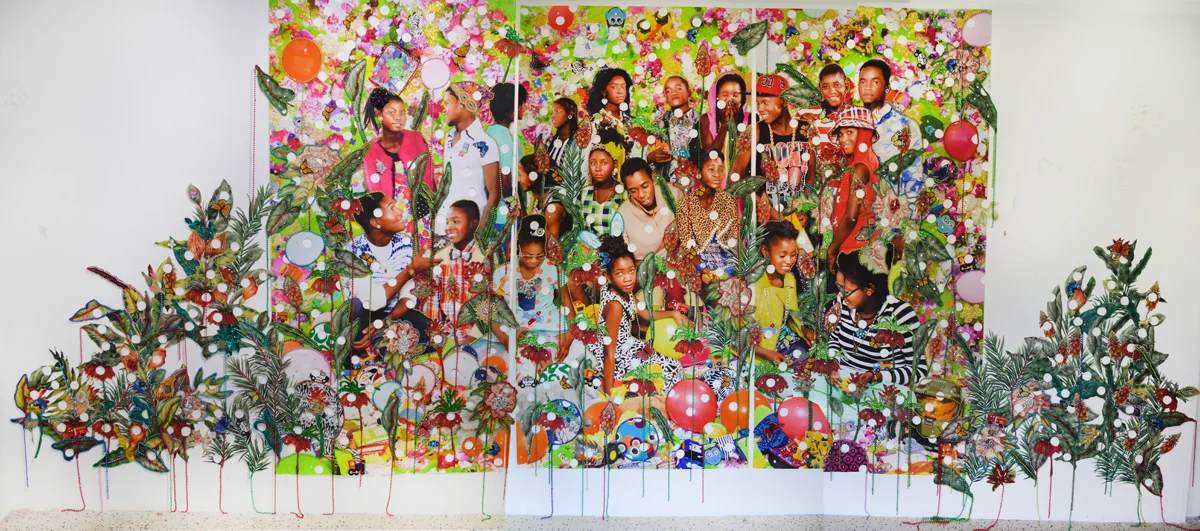Richard Learoyd at Pace/Macgill Gallery
Image above: ©2016 Richard Learoyd, Tatiana with Cape, 2010, camera obscura Ilfochrome photograph mounted to aluminum image, paper and mount, 58 x 48 inches / Courtesy of Pace/Macgill Gallery
Image above: ©Ashley Comer, Opening Night, Top left: Artist
New York, February 29, 2016 – Pace and Pace/MacGill Gallery were pleased to inaugurate their representation of British artist Richard Learoyd with an exhibition of his large-scale color and black-and- white photographs made over the last decade. Featuring a selection of portraits, landscapes, and still lifes, Richard Learoyd will be on view on the second floor.
Image above: ©2016 Richard Learoyd, The Waiting Room, 2015, camera obscura Ilfochrome photograph mounted to aluminum image, paper and mount, 58 x 48 inches / Courtesy of Pace/Macgill Gallery
With an unparalleled passion for the medium and its materials, Richard Learoyd explores the limits of photographic expression in his portraits, nudes, still lifes of animals and mirrors, and views of the English countryside. His work occupies a unique place within the practice of contemporary photography, employing anachronistic production techniques, borrowing from the aesthetics of the finest figurative painters of the 19th and 20th centuries, and drawing upon the longstanding tradition of vanitas imagery. Despite their art historical relevance, however, Learoyd’s photographs evoke a timeless quality and remain universally resonant.
Image above: ©2016 Richard Learoyd, Headless, 2014, camera obscura Ilfochrome photograph mounted to aluminum image, paper and mount, 68 x 48 inches / Courtesy of Pace/Macgill Gallery
Using the antiquarian process of the camera obscura (from Latin for “dark room”), Learoyd's color pictures are unique, direct-positive images produced without film negatives or digital technology. Learoyd began experimenting with this unconventional method during his post-graduate year, refining his practice in 2003 with the creation of a room-sized camera in which light-sensitive photographic paper is exposed. His subject – whether a sitter or still life – occupies an adjacent room containing a powerful light source; a lens mounted onto a bellows connects the two. As light falling on the subject is recorded directly onto a sheet of Ilfochrome paper, the resulting hyper-real image is entirely grainless and acutely detailed, though shallow in depth of field. Learoyd’s recent large-format, black-and-white photographs likewise reference the medium’s heritage, employing the negative/positive process invented by William Henry Fox Talbot nearly two centuries ago. Up to 80 inches wide, they are among the largest gelatin silver contact prints ever made.
Image above: ©2016 Richard Learoyd, Yosef, 2008, camera obscura Ilfochrome photograph mounted to aluminum image, paper and mount, 68 x 48 inches / Courtesy of Pace/Macgill Gallery
In their exquisite articulation and impressive physical presence, Learoyd’s photographs celebrate the profound pleasure of observation. They invite viewers to revel in their alluring appearance: the sharply in focus, the softly out of focus, and the sumptuous tones surrounding the subject. The sheer visual impact of Learoyd's work, however, is inextricably tied to his interest in the emotional and psychological depths of his subjects. The meditative, solitary gaze of his sitters is met by our own as we contemplate their enigmatic internal narratives and the quietly powerful quality of introspection that pervades his portraits. While Learoyd's pictures are both technically admirable and transcendently beautiful, it is ultimately their emotive sensation that lingers beyond the viewing experience. Learoyd writes:
The pictures are about extending the duration of looking. I want them to frustrate our desire to instantly understand a photographic representation of a person. My hope is that they inspire a truly reflective view: a view of intimacy and understanding, an insight into another that will increase our humanity.
Image above: ©2016 Richard Learoyd, Square Flamingo, 2014, camera obscura Ilfochrome photograph mounted to aluminum image, paper and mount, 48 x 48 inches / Courtesy of Pace/Macgill Gallery
Richard Learoyd (b. 1966, Nelson, Lancashire, England) studied photography under the landscape artist Thomas Joshua Cooper at the Glasgow School of Art, Scotland. His large-scale portrait and still life photographs were the subject of the recent exhibition, Richard Learoyd: Dark Mirror, at the Victoria and Albert Museum, London (2015-16) and the J. Paul Getty Museum, Los Angeles will mount a solo exhibition of his work later this year. A comprehensive monograph of Learoyd’s color studio images, Richard Learoyd: Day for Night, was published by Aperture in collaboration with Pier 24 Photography in the fall of 2015.
Image above: ©2016 Richard Learoyd, Tatiana Nude 1, 2012, camera obscura Ilfochrome photograph mounted to aluminum image, paper and mount, 58 x 48 inches / Courtesy of Pace/Macgill Gallery
His photographs are held in the permanent collections of institutions worldwide, including The Metropolitan Museum of Art, New York; The Nelson-Atkins Museum of Art, Kansas City; Pier 24 Photography, San Francisco; San Francisco Museum of Modern Art; Victoria and Albert Museum, London; and Yale University Art Gallery, New Haven; among others.
Learoyd lives and works in London, England.











